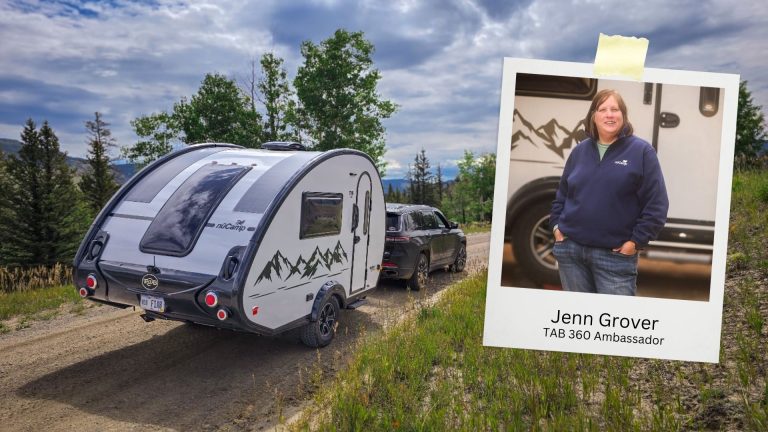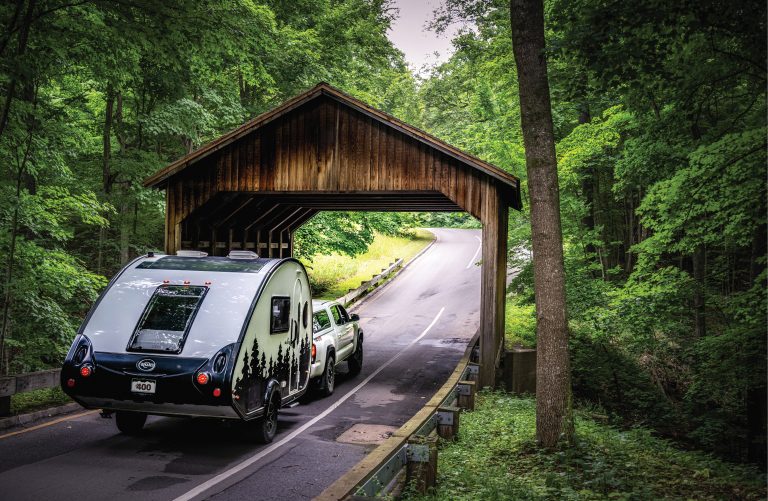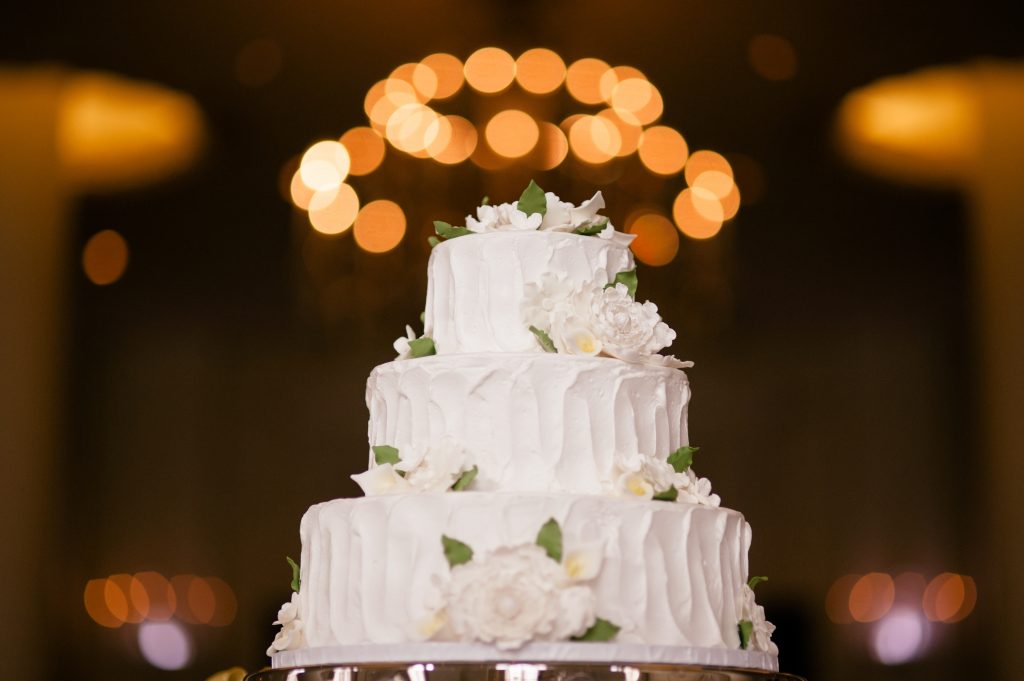This year at uCamp, one of nuCamp’s sponsored meals is an Amish Wedding Dinner. The event will be in celebration of TAB 400 ambassadors Mandy Lea and Kendrick, who got engaged in December. Reuben Shetler, a nuCamp team member, writes about the traditions of an Amish wedding.
An Amish Wedding: Love, Worship, and Food
A buggy crests a hill in Amish Country. The horse trots briskly, his nostrils emitting a steamy vapor. The quiet morning air is cut by the sharp pounding of his hooves on the pavement.
As the buggy descends into the valley, a wonderous sight greets its occupants. Numerous black buggies dot the road. They are all headed to the farm located in the center of the valley. In single file, the buggies clatter in the long, gravel lane. They converge in a large, flat field behind the barn.
The field is a whirl of activity. Ladies in black bonnets are stepping out of the buggies while their bearded husbands unhitch the horses. Teenage boys appear to take the horses. They lead them into the barn and tie them into box stalls, where the horses will munch hay the rest of the day.

An Amish wedding is a celebration to behold. Hundreds of people are invited to partake of the joy. The planning has been going on for at least a year. Now the big day is here — a day of love, worship, and food.
After unhitching, the guests walk up the gravel driveway to the barn. School-age gift boys come running to take the wrapped presents the guests are carrying. They whisk them away to the tent set up on the lawn behind the house.
At the entrance of the upper level of the big, red barn sits the bridal party. It consists of the bride, the groom, and the two couples that are serving as witnesses. It’s the highest honor that can be imposed on a young Amish couple, to be chosen to be part of a bridal party at a wedding.
The bridal party sits in chairs right outside the barn. All guests file past as they arrive and shake their hands. Then the guests stand in a large circle to the right of the bridal party, and each newcomer makes his round to shake hands with everyone.
At precisely 8:00, the officiating bishop announces, “Let us be seated.” He leads a long string of bishops, ministers, and deacons into the barn. Then the rest of the guests follow suit. However, the bridal party remains seated outside.
The ceremony is about to begin.
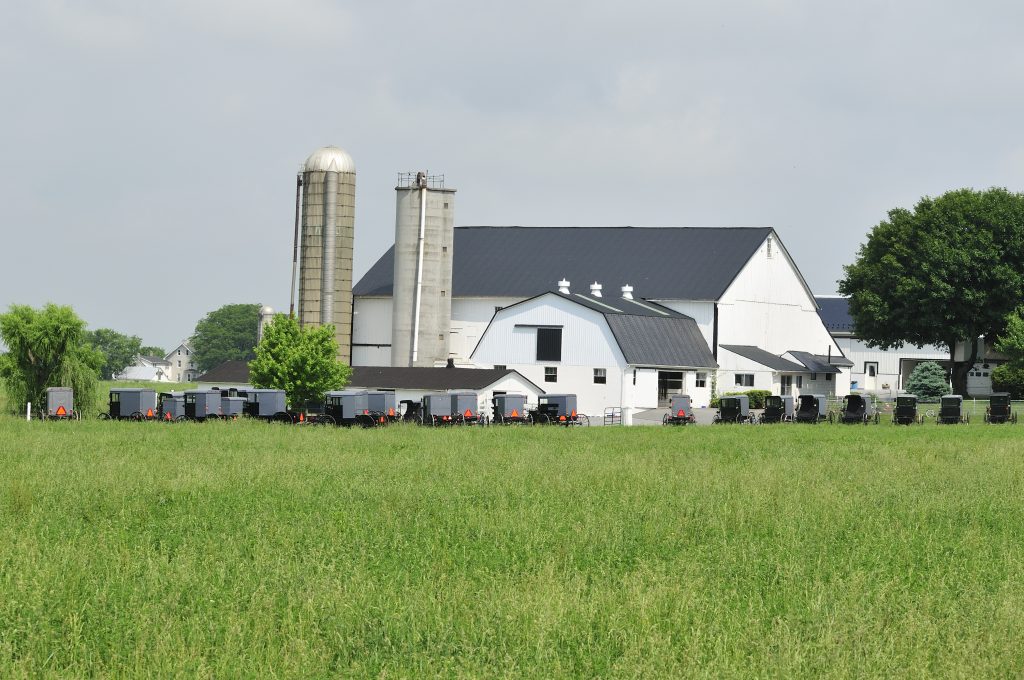
* * * *
The smell of fried chicken permeates the morning air. It sizzles in the fryers, the golden breading turning brown in the bubbling grease. Excited women bustle through the tent, chatting nonstop. They scoop the chicken into pans and take it into the rented kitchen on wheels that sits at the edge of the driveway.
Women carrying pots of mashed potatoes dodge women carrying pots of mixed vegetables. Women making gravy hustle around women working on the dressing. They’ve been at it since 4:00 AM. Preparing food for an Amish wedding is no small task. It’s a momentous feat accomplished by friends, neighbors, and relatives of the bride and groom. It’s quite an honor to be chosen as a cook for the wedding.
Suddenly the lively chatter in the tent and kitchen on wheels is hushed. All eyes turn to the barn. The bishops and ministers are exiting the ceremony and heading for the house. The bridal party rises out of their chairs. The witnesses turn to the side and walk out to the tent. But the bride and the groom follow the bishops and ministers into the house. They are headed to the council room to receive final words of guidance and instruction before they are joined in marriage.
* * * *
The upper level of the barn resonates with songs of praise. Beneath the timber beams, rows of benches sit atop the wooden floorboards. The men and women sit on opposite sides of the ceremony, facing each other. They sing slow worship hymns that have been handed down since the 1500s. The words are German, and the tunes are slow and haunting. Each syllable is dragged out until the words become unrecognizable.
This is a tradition that began when their Anabaptist forefathers were persecuted for their faith. In prison, they sang their songs so slowly that the guards couldn’t recognize the words they were singing. The songs are mournful but eerily beautiful. It has been said if one listens closely to Amish church songs, he can hear angel voices blending in.
Suddenly the singing stops. The congregation sits in silence, with all eyes on the open barn entrance. They are waiting on something before starting the next song. The minutes tick by, and the silence remains. It hovers over the waiting men and women in solemn sacredness, brimming with anticipation.
Then the bridal party appears at the entrance, walking in single file, with the groom and bride in the middle. Instantly the entire congregation bursts into song. “Thou hast taken a wife,” are the words that resonate into the rafters. The words are referring to Christ taking the Church as His bride, but they are very fitting for this earthly occasion.
The young men in the bridal party are dressed in plain black suits. The women wear dark blue dresses, the color of love. The dresses are enhanced by white capes and aprons, the color of purity. Small black head coverings adorn the women’s heads.
An Amish bride is stunningly beautiful in her simple but elegant garments. Her eyes sparkle with excitement, but her face is somber. Marriage is a joyful but serious commitment.
The bridal party stops at their appointed seats in the center of the barn. They pause, the men and the women facing each other. Then they all sit down in unison.
Moments later, the bishops and ministers come walking back in. The singing ceases. The ministers take their seats in the center row. Then the first preacher rises to do the Opening. He speaks for about 20 minutes. Amidst words of encouragement concerning marriage, he tells the story of Creation. He reminds the congregation of God’s plan for a man and a woman to have a godly union and to be a help to each other.
After kneeling for prayer, the congregation is seated again, and the bishop who will marry the couple gets to his feet. His sermon will last at least an hour.
* * * *
Outside the barn, a large group of people converges. The cooks, servers, dishwashers, and all the other people associated with preparing the meal are getting ready to enter the ceremony. They file inside and take their seats.
The bishop opens the Bible and reads 1 Corinthians 7. This is a sign that he is almost ready to marry the couple. After the scripture reading, he launches into the story of Tobit.

This tale of old is from the Apocrypha, a canon of books that were once a part of the Old Testament. The story of Tobit is about a young maiden who had seven husbands who died before she finally got married to a God-fearing man named Tobit. It is custom for this story to be told at every Old Order Amish wedding.
Then the bishop utters the words everyone has been waiting for. “If you still feel the way you did this morning, you may tread up here, and we’ll continue, with the help of God.”
The young couple rises and solemnly walks to the bishop. After they make their vows, the bishop asks everyone to rise in prayer. After the congregation is seated again, he clasps the groom and bride’s hands together and proclaims, “In the name of the God of Abraham, Isaac, and Jacob, I pronounce you husband and wife. You can now no longer part until our beloved God parts you in death.”
Quietly, the newlyweds walk back to their seats. They face each other, then sit down together. The bishop continues with his sermon as if nothing extraordinary has happened. The cooks and helpers begin filing out to finish the final preparations for the meal. But if you look closely at the faces of the bride and groom, you’ll see beams of joy threatening to burst past their solemn charade.
* * * *
The final note of the last song drifts into the rafters. It’s noon, and the ceremony is over. The bridal party rises and exits the barn. It’s now time for the reception in the shop building beside the house. This building was constructed specifically for family gatherings and events that host a large group of people. Almost every Amish homestead has a building like this.
On the way to the shop, the bride darts into the house, and dashes to her room. She swaps her black head covering for a white one. She’s a married woman now, and married women wear white head coverings.
The bridal party enters the shop and sits in the “eck” to watch the guests file into the reception. The eck is a special table set up in the corner for the three honored young couples. The groom and bride sit in the middle, then the table wings out at 45-degree angles on either side for the witnesses.
The eck is decorated splendidly to the bride’s taste. On the wall behind it, old-fashioned barn siding has been installed. A decorative wooden beam juts over the bridal party’s heads with twinkling strip lights entwined around it. A white wedding cake, three layers high, sits proudly in front of the newlyweds. A wooden plaque hangs on the wall, with the couple’s Marriage Prayer engraved upon it. Everything is decked out with a cowboy theme. Cowboy hats, boots, and ropes are scattered throughout the shop as decorations.
In front of the eck are rows and rows of tables. They are a spectacular sight. They’re graced with white tablecloths, glass dishes, silverware, candles, and flowers. It looks like a scene straight out of a medieval castle.
It takes some time to seat the 300+ guests. This duty is performed by the parents of the newlyweds. The closer you get to sit to the eck, the higher the honor.
The bishop yells out, “Let us thank God for this food!” The shop falls silent as all heads are bowed in prayer.
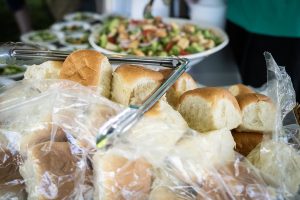
The prayer ends, and someone begins to sing. Each plate contains a fancy printed paper with the words of the song. The ceiling of the shop can barely contain the gusty rendition of “How Great Thou Art.”
The instant the song ends, the servers flock to the tables carrying baskets of dinner rolls. It is time for the food. And oh, what a feast! No other event can rival the tantalizing food of an Amish wedding.
First, it’s the warm, buttery dinner rolls. Then an extravagant salad. Then the chicken arrives. There’s both brown chicken and white, breaded and fried in oil, and full of flavor. Then the mashed potatoes, soft and fluffy and hot, are topped with brown butter. There’s steaming dressing and gravy. There’s a colorful mixture of vegetables.
And then, when you think you can absolutely eat no more, the dessert arrives. First comes a bowl of fruit. Blueberries, strawberries, black and red raspberries, pineapples, and grapes, slathered with a sweet filling that hints at 7-Up. Then there’s chocolate cake and turtle cake. Last comes the soft-serve ice cream, chocolate, vanilla, and strawberry. After partaking in it all, one gets the feeling he need not eat again for a week.
* * * *
“From Mose Yoders. Thank you!” The groom holds the gift high. The wedding has shifted to the tent on the lawn. People sit on benches, watching the unwrapping of the gifts.
It’s phenomenal what the newlyweds will receive on their special day. Four tables are piled high with gift bags and wrapped presents, containing all sorts of kitchen items and household furnishings such as clocks, carpets, blankets, bird feeders, and more. The bigger items sit on the ground in front of the tables. There’s a picnic table and a wheelbarrow. There’s a garden tiller and a generator. There’s a leaf blower, a gas grill, and a lawn mower. There’s a washing machine. There are numerous folding chairs. There’s virtually everything this couple will need, short of a house and a barn.
As is custom, the witnesses unwrap the gifts. The women write into the cards what each gift was so the married couple can look back later and remember. The witnesses hand the gifts to the newlyweds, then they hold them up, and the groom announces who gave the gift, and says thank you. At some weddings, at the end of the gifts, the groom lifts up the bride, and thanks her parents.
It will take the rest of the afternoon to open all the gifts.
* * * *
Once again, the shop building rings with song. As soon as the last note dies away, the youth at the table nearest to the eck leap out of their seats and file past the eck to shake hands with the bridal party. The evening meal is over.
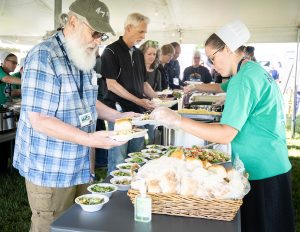
Whereas the noon meal consists mainly of adults and young children, the evening meal is mostly teenagers. It is common for the youths to wait to attend the wedding until evening. The same meal is served again. After eating, the youth sing four songs that are printed on song sheets. While they sing, the parents of the bride and groom cut the wedding cake. All the cooks and servers then may take a piece home. After the singing is over, the youth shake hands with the bridal party, then they leave pretty much right away.
By now it is late. But the day is far from over. As the last youth disappear out the door, the men spring into action. They grab benches and start loading them onto the bench wagon. The women begin collecting and cleaning the dishes. The tables are loaded onto a separate trailer. The eck is dismantled. Cookware is washed and stored neatly on the kitchen on wheels. The entire farm is a whirl of activity as people clean up every nook and cranny. Overhead, the stars twinkle merrily. But under the glare of floodlights set up with a huge generator, dozens of men and women turn the glamorous wedding reception back into an empty farm shop.
Then, as quick as you can say “pass me my bonnet, please,” buggies are being hitched up. The barn that had been bursting with horses a half-hour ago is suddenly completely empty. Buggies rattle off into the night. Their faint lights disappear over the crests of distant hills.
It’s almost midnight. The lights in the farmhouse wink out. The wedding is over.
Recent Articles

